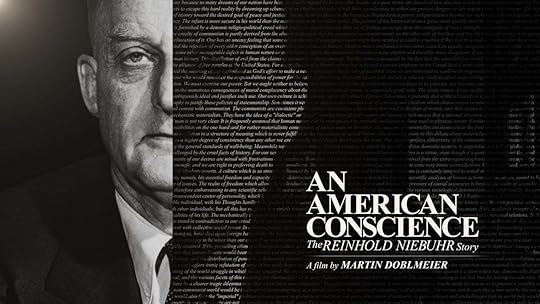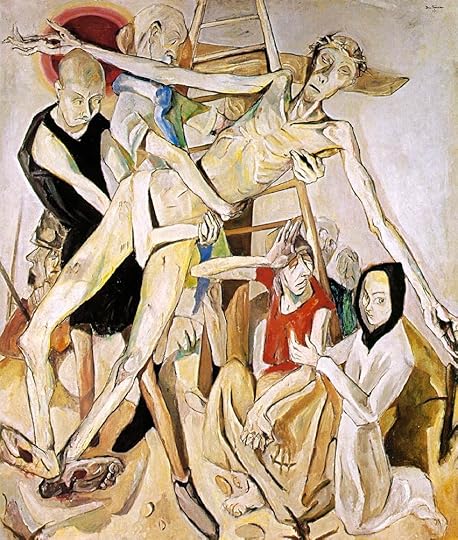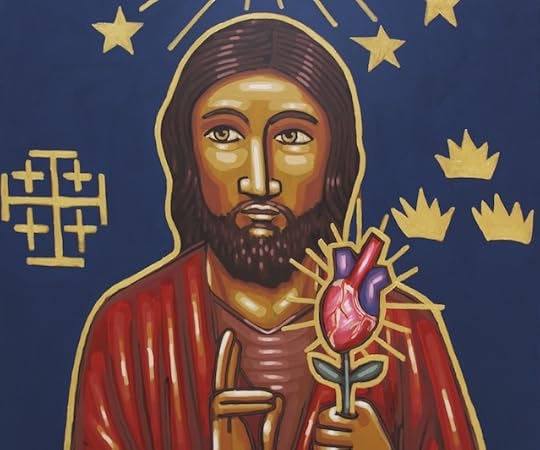Jason Micheli's Blog, page 142
April 20, 2017
Episode 90: Martin Doblemeir: Searching for a New Niebuhr
 In the age of Trump does America need a new public theologian? Someone like Reinhold Niebuhr?
In the age of Trump does America need a new public theologian? Someone like Reinhold Niebuhr?
Jason caught up with Martin Doblemeir, the founder and president of Journey Films, to talk about their latest project, “An American Conscience: The Niebuhr Story.” Jason took the name of his blog, Tamed Cynic, from Reinhold Niebuhr’s memoir, a book first given to him as a new Christian by his mentor Dennis Perry.
Jason took the name of his blog, Tamed Cynic, from Reinhold Niebuhr’s memoir, a book first given to him as a new Christian by his mentor Dennis Perry.
From Journey Films: “An American Conscience: The Reinhold Niebuhr Story examines the career and global impact of renowned American-born theologian Reinhold Niebuhr, who became a voice of conscience to a country reaching the pinnacle of its economic and political power. As the Great Depression gripped America, he rocked the liberal Christian community with ‘Moral Man and Immoral Society,’ which challenged the idea of inherent progress and justice in history. During and after the war, Niebuhr helped establish the infrastructure that gave Christian churches and thinkers a voice in postwar politics, and proved instrumental in the effort to form the World Council of Churches.”
Check out the film on Journey’s website. It’s currently on tour and airing on PBS.
Next up: conversations with man Stanley Hauerwas says is the best theologian in America, Robert Jenson, and Rod Dreher of Benedict Option fame as well as Carol Howard Merritt about her new book.
Stay tuned and thanks to all of you for your support and feedback. We want this to be as strong an offering as we can make it so give us your thoughts.
You can download the episode and subscribe to future ones in the iTunes store here
Do Your Part!
With weekly and monthly downloads, we’ve cracked the top 5-6% of all podcasts online.
Help us reach more people: Give us 4 Stars and a good review there in the iTunes store.
It’ll make it more likely more strangers and pilgrims will happen upon our meager podcast. ‘Like’ our Facebook Page too. You can find it here.
Oh, wait, you can find everything and ‘like’ everything via our website. If you’re getting this by email, here’s the link. to this episode.
Follow @cmsvoteup

April 19, 2017
Easter: It’s Not a @#$%^&* Metaphor
If it were a metaphor, we should worship the universal principle behind the metaphor instead of Jesus Christ. Or so I argue. For Easter, Dennis Perry and I did a dialogue sermon for all 5 services. Dialogues aren’t really my forte but I think this one turned out solid. You can listen to it below. You can listen watch the live stream of the 8:30 service here.
Follow @cmsvoteup

April 18, 2017
Easter 2A with Brian Zahnd: Do Not Abandon Me to Hell
 The Second Sunday of Easter is upon us and, with it, Doubting Thomas and Peter preaching resurrection in Acts 2.
The Second Sunday of Easter is upon us and, with it, Doubting Thomas and Peter preaching resurrection in Acts 2.
Taylor and I talked with Brian Zahnd about the lectionary readings for Sunday, challenging him to ignore the Gospel reading and focus on the other readings instead. Brian is the pastor at Word of Life Church in St. Joseph, Missouri. He’s also the author of Water to Wine, Farewell to Mars, and Beauty Will Save the World. Check him out at www.brianzahnd.com.
All of it is introduced by the soulful tunes of my friend Clay Mottley.
You can subscribe to Strangely Warmed in iTunes.
You can find it on our website here.
Help us reach more people:
Give us 4 Stars and a good review there in the iTunes store.
It’s not hard and it makes all the difference.
Follow @cmsvoteup

April 17, 2017
Do You Disbelieve the Resurrection? Or, Do You Disbelieve the Possibility of Resurrection?
 This Easter, in the dialogue sermon I participated in with Dennis Perry, I mentioned how I believe in the resurrection of Jesus Christ because I know Jesus Christ is alive and so God must have raised him from the dead. That is, when I was 17 years old or so I had an encounter with the Risen Christ.
This Easter, in the dialogue sermon I participated in with Dennis Perry, I mentioned how I believe in the resurrection of Jesus Christ because I know Jesus Christ is alive and so God must have raised him from the dead. That is, when I was 17 years old or so I had an encounter with the Risen Christ.
Like so many other Christians I know.
Like the 514 witnesses whose names Paul can tick off in 1 Corinthians 15.
Quite obviously this was a subjective assertion, rooted in my own experience of being encountered and was decidedly not- as one vociferous worshipper grumbled- an “empirical or objective explanation” for the resurrection.
While the Barthian in me bristles at the unexamined assumption that that which is ‘objective’ and true must be empirically verifiable, it’s nonetheless true that the same Barthian in me is allergic to rational apologetics. I simply do not believe that the claims of Christianity can or should be rendered demonstrably true or, even worse, reasonable.
Any Christianity that ‘makes sense’ flies in the face of the first truth of the faith:
Dead people stay dead.
And what God does in Christ is completely unexpected and counterintuitive.
Having said that, however, maybe the grumbling worshipper (a Deist in Christian clothes) was on to something. I do not believe in apologetics or making the common-sense case for Christ, yet neither do I believe that the ineffable and ineluctable nature of the resurrection makes it UNreasonable.
To say the resurrection of Christ is beyond historical verification is true, for we believe God intervenes from beyond history to raise Jesus from beyond the grave.
But to say the resurrection of Christ is beyond historical verification is not also to suggest that the resurrection of Christ is beyond historical plausibility, for we believe God intervenes to raise Jesus from the grave within history.
In fact, though it wasn’t the intent of the Easter sermon, to argue the plausibility of the resurrection, I do think the resurrection is the best- or at least a compelling- historical explanation for the resurrection of Jesus.
I believe it.
Like Paul, and for that matter like every story there is, I believe the ending of the story determines the truth and worthwhileness of everything which precedes it. If Jesus is not raised, I’m with Nietszche because if Jesus is not raised all the facts of history are on Friedrich’s side not Yeshua.
I do believe in the resurrection. I believe it based on my subjective experience, and I believe it as history. Some of you, I know, do not. Actually, my experience as a pastor in Mainline Christianity has taught me that a good many Christians, if not the majority, do not believe anything actually happened on Easter morning.
In my experience, most quietly confess the creeds but inwardly believe that Jesus was only raised in the hearts of his followers. Others are more open about their doubts, armed with just enough popular press ‘facts’ to miss just how impoverished is their logic- never seriously considering how, to take one example, someone’s existential experience of feeling Jesus in their heart was not likely to persuade another and even less so to lead them to a cross of their own.
Even still, I know some of you doubt the resurrection.
And I want to know why. Or what.
So if you doubt the resurrection, I’ve got some questions for you to consider. And, if you’re so bold, to answer:
If it’s true that God raised Jesus from the dead, triumphing over Death and Sin would you then be willing to trust that he is ‘Lord?’
Or, would you at least believe that, having been vindicated by God, Christ’s obedience is what God desires from all of us?
If you say, No, then do you think Easter is irrelevant regardless of whether it’s true or not? Why?
If you say, Yes, then, other than the manner in which we’ve received the gospel, how would you expect the news of Jesus’ resurrection to reach us today? What else would you require to accept it as a trustworthy witness?
And if you would require some other ‘evidence’ of the resurrection, are you actually saying that you need another miracle to verify the prior miracle of the resurrection?
Or are you saying that that even if God raised Jesus from the dead you would not believe? Because you don’t believe in miracles at all? Period.
And if you don’t believe in miracles at all, if you believe then that creation is a closed system from which God is transcendentally apart and in to which God does not act, then aren’t you really saying (even if you go to Church, pray etc) that you’re an atheist?
Or a clockmaker Deist like TJ?
But then that leads to one last question, the money question:
If creation is a closed system in which something could not have happened because we do not now observe it happening, then isn’t your ‘reason’ itself a product of that closed system?
And if so, then hasn’t your mind and reason evolved purely through natural selection alone? To give you a better chance only at survival?
And if so, then on what grounds could your mind and reason possibly be in a position to know what is true about reality (that closed system) as a whole?
There’s a big, big difference between saying ‘I do not believe the resurrection of Jesus happened’ and ‘I do not believe resurrections can happen.’
I suspect most claim the former while in fact confessing the latter, not realizing they leave this trail of logic behind them…
Resurrections (as events from beyond history in history) cannot happen.
Therefore God (as Being and Actor beyond history) does not exist.
Therefore Reason (my ability to speculate about the bounds of history and reality) does not exist, or at least not in the manner in which I assume.
Or, as my teacher David Bentley Hart puts it: 
“…it makes sense to believe in both reason and God, and it may make a kind of nonsensical sense to believe in neither, but it is ultimately contradictory to believe in one but not the other.
An honest and self-aware atheism, therefore, should proudly recognize itself as the quintessential expression of heroic irrationalism: a purely and ecstatically absurd venture of faith…”
In other words, while belief in the resurrection yields fools for Christ, non-belief in its possibility yields fools.
Follow @cmsvoteup

April 15, 2017
Episode 89 – Drew Colby: I’m a Racist (And So Can You!)
In all the commotion of Holy Week, I forgot to push our latest conversation from Crackers and Grape Juice.
In Episode 89 (we’ve been at this almost a year now and we’re nearing #100!), Teer Hardy and I talk with our friend and colleague Drew Colby about racism.
Drew Colby is a UMC elder, pastor, and one of the podcast’s biggest fans. And critics.

Coming up on the podcast:
Martin Doblmeier of Journey Films. Followed by Robert Jenson and Rod Dreher of Benedict Option fame. Stay tuned and thanks to all of you for your support and feedback. We want this to be as strong an offering as we can make it so give us your thoughts.
You can download the episode and subscribe to future ones in the iTunes store here
We’re breaking the 1K individual downloaders per episode mark.
Help us reach more people:
Give us 4 Stars and a good review there in the iTunes store.
It’s not hard and it makes all the difference.
It’ll make it more likely more strangers and pilgrims will happen upon our meager podcast. ‘Like’ our Facebook Page too. You can find it here.
Oh, wait, you can find everything and ‘like’ everything via our website.
If you’re getting this by email, here’s the link.
Follow @cmsvoteup

April 14, 2017
I Desire Sacrifice Not Mercy
 Here’s my Good Friday sermon from tonight, using the lectionary text from Hebrews 10.11-25
Here’s my Good Friday sermon from tonight, using the lectionary text from Hebrews 10.11-25
On Ash Wednesday, I suffered my monthly battery of labs and oncological consultation in advance of my day of maintenance chemo.
During the consult, after feeling me up for lumps and red flags, my doctor that day- a new one as my own doctor was on the DL for cancer of his own- flipped over a baby blue hued box of latex gloves and illustrated the standard deviation of years until relapse for my particular flavor of incurable cancer.
Cancer didn’t feel very funny staring at the bell curve of the time I’ve likely got left. Until.
Leaving my oncologist’s office, I drove to Fairfax Hospital to visit a parishioner here at Aldersgate named Jonathon.
Jonathon’s a bit younger than me with a boy a bit younger than my youngest. He got cancer a bit before I did. He’d thought he was in the clear. No.
The palliative care doctor was speaking with him when I stepped through the clear, sliding ICU door. After the doctor left, our first bits of conversation were interrupted by a social worker bringing with her dissonant grin a workbook, a fill-in-the-blank sort, that he could complete so that one day his boy will know who his dad was.
I sat next to the bed. I know from both from my training as a pastor and my experience as a patient, my job was neither to fix his feelings of forsakenness nor to protect God from them. My job, I knew, as both a Christian and a clergyman, wasn’t to do anything for him, but, simply, to be with him.
I listened. I touched and embraced him. I met his eyes and accepted the tears in my own. Mostly, I sat and kept the silence as though we both were prostrate before the cross. I was present to him.
We were interrupted again when the hospital chaplain knocked softly and entered. He was dressed like an old school undertaker and was, he said without explanation or invitation, offering ashes.
Because it was the easiest response, we both of us nodded our heads to receive the gritty, oily shadow of a cross.
With my own death drawn on a picture on the back of a box of latex gloves and his own death imminent, we leaned our foreheads into the chaplain’s bony thumb.
“Remember,” he whispered (as though we could forget), “to dust you came and to dust you shall return.”
As if every blip and beeping in the the ICU itself wasn’t already screaming the truth: none of us is getting out of life alive.
———————-
You’re not, FYI, getting out of life alive.
When you give up the ghost, your soul isn’t going to fly away to the great by-and-by.
Your body isn’t going to become just a shell while your spirit whisks away down a bright tunnel filled with warm light.
People will stand by your grave and weep, as they should, because you are not a thousand winds that blow. You are not the diamond glints on snow.
You are there. Planted in the ground. Earth to earth. Dust to dust.
Ashes awaiting God’s final resurrection.
None of us is getting out life alive.
Someday, maybe soon maybe later, your breath will become air.
And you will be as dead as Jesus is tonight, every bit as dead as Jesus is tomorrow and tomorrow night.
If Jesus doesn’t get to Easter without going through Good Friday then neither do we. We are baptized, after all, not into a club called church. We’re baptized into death, his death.
Death is not natural. It is the enemy of God, says scripture; however, death is as ubiquitous as it is inexorable.
None of us is getting out of life alive.
And we don’t like to talk about it much anymore in churches like ours with tax brackets like yours but, before the final resurrection, you will be called before the mercy seat of Almighty God, what the Book of Common Prayer calls “…the dreadful day of judgment when the secrets of all our hearts shall be disclosed.”
That line about “the dreadful day of judgment” comes from the wedding liturgy, right before the vows so that the bride and groom know the stakes before they promise not to destroy each others’ lives.
Because all of us, married or not- we are a people who actively every day do damage to the people in our lives and every day by our apathy do damage to people we never see except in the news.
We’re sinners.
And as we are, just the way we are, to stand before the Lord would be a terror not a joy. We forget- that’s why the Israelites charged Moses to go up Mt. Sinai to go before the Lord. They didn’t want to do so themselves.
That isn’t to say God is awful or angry; it’s to recognize that very often we are both, awful and angry, and if God is a refining fire then to stand before the Lord just as we are, the way we are, the sum of so many of our sins- to stand before God who is a refining fire means that there is much of us- much about us- that will get burned away by the holiness of God.
———————-
Speaking of fire, no doubt talk of judgment sounds brimstone harsh to you.
Of course it does. You have been conditioned by a culture that has made that word ‘judgment’ the worst of pejoratives: judgmental. And if its the worst that can be said of us, it’s the last that should be said of God.
We think.
God, our culture has conditioned us to think, is like Billy Joel.
God accepts you just the way you are, which is ironic because it turns out Billy Joel didn’t love Christie Brinkley just the way she was. He went searching for something else from someone else, which maybe makes him someone who shouldn’t be accepted just the way he is either.
I don’t mean to pile on Billy Joel; I know some of you love him more than Jesus. I don’t mean to pile on Billy Joel or you. Lord knows- or least my wife knows, I’m no better than most of you.
I don’t mean to smote you with fire and brimstone. Since it’s Good Friday, I mean only to point out the basic presupposition of Jesus’ Bible.
This:
You aren’t acceptable before the Lord just the way you are.
The gap between our sinfulness and the holiness of God is too great. We aren’t acceptable before the Lord just the way we are. We have to be rendered acceptable. We have to be made acceptable, again and again.
That’s the thread that stiches together the Bible by which Jesus understood himself and understood his death.
———————-
Thus does the Book of Leviticus begin with God’s instructions for a sin-guilt offering: “The petitioner is to make his offering at the door of the tent of meeting so that he may be accepted before the Lord.”
The worshipper, instructs God to Moses, should offer a male from the herd, a male without blemish; he shall offer it at the door of the tent of meeting, what becomes the veil to the holy of holies when the temple in Jerusalem is built.
God instructs Moses that the sinner is to lay his hand upon the head of the offered animal and “it shall be accepted as an atonement for him.”
For him. On his behalf. In his place.
The offered animal, as a gift from God given back to God, is a vicarious representative of the sinner. The offered animal becomes a substitute for the person seeking forgiveness. The blood of the animal conveys the cost, both what your sin costs others and what your atonement costs God.
God intended the entire system of sacrifice in the Old Testament to prevent his People from thinking that unwitting sin doesn’t count, that it can just be forgiven and set aside as though nothing happened, as though no damage was done.
Those sacrifices, done again and again on a regular basis to atone for sin, were offered at the door of the tent of meeting. Outside.
But once a year a representative of all the People, the high priest, would venture beyond the door, into the holy of holies, to draw near to the presence of God and ask God to remove his people’s sins, their collective sin, so that they might be made acceptable before the Lord.
Acceptable for their relationship with the Lord.
After following every detail of every preparatory ritual, before God, the high priest lays both his hands on the head of a goat and confesses onto it, transfers onto it, the iniquity of God’s People.
And after the high priest’s work was finished, the goat would bear the people’s sin away in to the godforsaken wilderness; so that, now, until next Yom Kippur, nothing can separate them from the love of God.
———————-
It’s easy for us with our un-Jewish eyes to see this Old Testament God behind the veil as alien from the New Testament God we think we know.
It’s easy for us to dismiss this God behind the tent door as aloof and unapproachable.
It’s easy for us to miss that it’s God who gives his People the instructions for all these sacrifices; that is, God himself gives his People the means for the ongoing restoration of their relationship with him.
In Jesus’ Bible it’s true we’re not acceptable before God just the way we are but it’s God himself who gives us the means not to remain just the way we are.
God gives his perpetually wayward People the means to stand before him unburdened and unafraid. So these sacrifices in the Old Testament are not the opposite of the grace we find in the New. They are grace.
As Christians we’re not to see them as alien rituals or inadequate even. We’re meant to see them as preparation. We’re meant to see them as God’s way of preparing his People for a single, perfect sacrifice (Hebrews 7).
—————————
Preachers and theologians like to point out how the Church never settled upon a single answer to the question “How does the death of Christ save us?”
The Gospels, after all, exposit Jesus’ crucifixion but they never explain it.
The creeds require us to profess that Jesus Christ suffered under Pontius Pilate, was crucified, died, and was buried, but the creeds do not ask us to agree on what that death accomplished or how.
Through the centuries the Church has offered possible answers.
On the Cross, God in Christ defeats the Power of Sin and Death. On the Cross, God in Christ transforms our hearts by demonstrating the love in his own. On the Cross, Jesus suffers the punishment owed to us, setting us free from our debt of sin by paying it in our place.
And so on.
Preachers and theologians like to point out how the Church never settled upon a single explanation for Christ’s death.
Except, that’s not exactly true.
The Church did decide to include in the New Testament canon the Book of Hebrews. Not only is it one of the longest books in the New Testament, it is the only book in the New Testament devoted entirely to describing the meaning of Jesus’ death.
And it does so exclusively by framing Jesus’ death in continuity with the sacrificial system of Jesus’ Bible.
But get this- all the sacrifices of the Old Testament they were to atone for unintended sin. There is no sacrifice, no mechanism, in the Old Testament to atone for the sin you committed on purpose. Deliberately. Not one.
By contrast, the Book of Hebrews describes Jesus’ death as the sacrifice for sin. All.
One sacrifice. Offered once.
For all.
For unwitting sin and for willful sin.
A sacrifice not just for God’s People but for all people.
———————-
Jesus, says the Book of Hebrews, isn’t a victim of our wrath. He isn’t a ransom paid to the Devil. He isn’t the punished in your place or the debt that ameliorates God’s offended honor.
Jesus, says the Book of Hebrews, is our Great High Priest.
He’s our Great High Priest not through lineage like those other high priests but “through the power of his indestructible life.”
Jesus, says the Book of Hebrews, bears the stamp of God’s own nature. He’s the heir of all things and through him all things were made.
But-
But he was made like us in every respect. This priest was made like his people in every way.
Just as we are tempted and weak, he was tempted and weak. Just was we hunger and thirst and fear and feel forsaken, so too did he hunger and thirst, fear and feel forsaken. He suffered just as we suffer. And, he died just as we die.
Just as none of us is getting out of life alive, neither did he.
His death, in other words, isn’t the death we had coming to us.
His death was a death that comes to us all.
His death isn’t a penal punishment but the product of his having been made like us in every respect.
He died the way he did because of the way he lived, but he died because he lived, because he was made like us in every respect.
And because he has been made like us in every respect, not only do we have a Great High Priest who sympathizes with us in our weakness we have a priest who when he enters the presence of God he does not go alone.
Aaron all the other high priests from the tribe of Levi they went beyond the veil alone and they came back alone.
But this Great High Priest in his flesh, his flesh of our flesh, he carries all of us- all of humanity- to the mercy seat of God, says the Book of Hebrews.
He draws near to the Holy Father and, in him, all of us draw near too.
And there this Great High Priest offers not a ransom or a debt.
This Great High Priest offers a gift.
Not a calf or a goat or grain but a gift so precious, so superabundant, as to be perfect.
A gift that can’t be reciprocated it can only redound to others.
His own life. His own unblemished life.
We choose to put him on a cross, but this Great High Priest chooses on it to gift himself as sacrifice, to sprinkle his own blood on the mercy seat of the cross, to make atonement.
For us.
A gift exceeding all cost such that no sacrifice ever need be offered again.
——————————-
Jonathon died this evening.
None of us is getting out of life alive.
But none of us need fear. None of us need to fear death, fear that day when the secrets of our hearts will be disclosed.
We need not fear because, after he gifts himself as a perfect once for all sacrifice, this Great High Priest never leaves the Father, because he draws near and stays near, because he sits down at the right hand of the Father permanently, says the Book of Hebrews, he intercedes for us.
Perpetually.
He intercedes for us. Perpetually. He prays for us. Without ceasing.
He confesses for us.
Perpetually.
So that-
Although we know we are not acceptable before the Lord just as we are, we need not fear.
We need not fear that God will make us more than we are.
We need not fear that the secrets of all our hearts one day will be disclosed and God will render us into something other than what we are now.
Thanks to our Great High Priest we can trust.
We can trust that when we die and our breath becomes air and the dust of our bones returns to the dust we will experience the refining fire of God’s holiness.
We will.
But we will not experience it as the wrathful heat of hell.
We will experience it as the warm light of God’s love.
Thanks to our Great High Priest we will all become as the Burning Bush, ablaze with God’s refining fire.
But not consumed by it.
Follow @cmsvoteup

Nothing But the Blood: No, You Can’t Excise the Language of Blood Sacrifice from the Cross
 A colleague recently advocated altering the traditional serving words for the eucharist (The body of Christ broken for you. The blood of Christ shed for you.) to: ‘Christ is here, in your brokenness. Christ is here, bringing you to life.’ Or, ‘Christ broken, with us in our brokenness. Christ’s life, flowing through our lives.’
A colleague recently advocated altering the traditional serving words for the eucharist (The body of Christ broken for you. The blood of Christ shed for you.) to: ‘Christ is here, in your brokenness. Christ is here, bringing you to life.’ Or, ‘Christ broken, with us in our brokenness. Christ’s life, flowing through our lives.’
Such redactions just won’t do the heavy lifting if one is committed to taking seriously the language of scripture. While the traditional imagery of blood sacrifice may make some squeamish as Fleming Rutledge insists:
It is “central to the story of salvation through Jesus Christ, and without this theme the Christian proclamation loses much of its power, becoming both theologically and ethically undernourished.”
Mainline Christians frequently express disdain for the blood imagery of scripture. We judge it, snobbishly Rutledge thinks, to be primitive; meanwhile, we let our kids play Black Ops 3, we fill the theaters for Fate of the Furious, and we refer to those innocents killed by our drones as ‘bugsplat.’ That is, if we care about the droned dead at all.
We exult in gore and violence in our entertainments, but we feign that we’re too fastidious to exalt God by singing ‘There’s a Fountain Filled with Blood.’
In our disinclination towards the language of blood and sacrifice, treating it as a detachable option in atonement theology, Christians today could not be more different from the writers of the Old Testament who held that humanity is distant from God in its sin and atonement is possible only by way of blood. Viewed from the perspective of the Hebrew Scriptures, we make the very error Anselm cautions against in Cur Deus Homo. We’ve not truly considered the weight of sin.
Editing out blood sacrifice commits the very act is intended to avoid, violence. It commits violence agains the text of scripture by eviscerating the language of the bible.
Scripture speaks of the blood of Christ 3 times more often than it speaks of the death of Christ .
Such a statistic alone reveals the extent to which blood sacrifice is a dominant theme in extrapolating the meaning of Christ’s death.
Scripture gives the witness repeatedly:
God comes under God’s judgement as a blood sacrifice for sin.
Put in the logic of the Old Testament’s sacrificial system: something of precious value is relinquished in exchange for something of even greater gain. Blood for peace.
We might find such language repellent. Many do. Perhaps we should recoil at it considering how its an indictment upon our own sinfulness. We might wish to alter the words we say when handing the host to a communicant. What we cannot do is pretend blood sacrifice is not the way scripture itself speaks.
Not only is blood sacrifice a dominant motif in scripture, its a theme upon which many other atonement motifs rely, such as representation, substitution, propitiation, vicarious suffering, and exchange. Something as simple as switching from ‘The blood of Christ shed for you’ to ‘The cup of love’ effectively mutes the polyvalence of scripture’s voice.
And what does lie behind our resistance to blood sacrifice?
I can’t help but wonder if the popular disdain for blood sacrifice owes less to our concern for violence and more to do with our contemporary gospel of inclusivity.
Along with the mantra of inclusivity’s charitable appraisal of human nature and its ever progressing evolution.
The self-image we derive from American culture is that I’m okay and you’re okay. We translate grace according to culture so that Paul’s message of rectification becomes ‘accept that you are accepted.’ God loves you just as you are, we preach, Because of course, God loves us. How could a good God not love wonderful people like us?
As Stanley Hauerwas jokes, we make the doctrine of the incarnation ‘God put on our humanity and declared ‘Isn’t this nice?!’
The governing assumption behind blood sacrifice could not be more divergent. ‘The basic presupposition here [in Leviticus],’ says Rutledge,
‘is that we aren’t acceptable before the Lord just the way we are. Something has to transpire before we are counted as acceptable…the gap between the holiness of God and the sinfulness of human beings is assumed to be so great that the sacrificial offering has to be made on a regular basis.’
The self-satisfied smile we see in Joel Osteen is a reflection of our own. Our glib view of ourselves is such that we cannot imagine why God would not want to come near us. Scripture’s sober view of us is that we cannot come near God, in our guilt, without God providing the means for us to live in God’s presence. Another life in place of our own, a blameless and unblemished one.
Whatever our reason for spurning blood sacrifice, our disdain for it raises an even more pernicious problem.
If we refuse to interpret Christ’s death as a blood sacrifice, ruling such imagery as out of bounds, what connection remains between Jesus and Jesus’ own scriptures?
To jettison blood sacrifice is to unmoor Jesus from the bible by which he would have understood his own deeds and death, making it unclear in what sense it makes any sense to say, as we must, that Jesus was and is a Jew. Disdain for blood sacrifice becomes a kind of supercessionism. Desiring to cleanse our view of God of any violence we unwittingly commit a far worse sort of (theological) violence: cleansing God of God’s People.
Which begs the question, if progressive Christians in America today are substantively different than the Christian European sophisticates of the late 19th century who viewed the ethnic, cultic faith of the Jews with similar disdain.
If we profess the conviction that a crucified Jewish Messiah is Lord, then we must submit to understanding him according to the terms by which he would’ve understood himself.
Follow @cmsvoteup

April 13, 2017
Yes, You Have to Believe in the Resurrection
Paul’s argues in 1 Corinthians 15 that if Jesus has not been raised from the dead then our faith is useless. Especially when it comes to Jesus’ teachings, we’re off the hook if Jesus has not been vindicated by God through resurrection.
These assertions naturally provoke pushback:
‘But you don’t have to believe in the Resurrection to be a Christian.
You can be a Christian by following the teachings of Jesus.’
Yeah, well, not really.
Never mind the irritating fact that if Jesus was not raised from the dead then there’s nothing transformative and death-defeating about his teaching. It just got him killed. Death had the last word (and still does).
If God did not raise Jesus from the dead, then God did not vindicate Jesus’ life, his way of life.
His teachings.
So then there’s nothing special about them, they lead only to crosses.
And then Nietzsche is right: power and will are the only sane, responsible ways to live in this world.
And then Paul is right: of all people in the world, we’re the most pitiable.
But the resurrection is a necessary belief on a less theological level too.
On an evidentiary level.
Think about it:
If I was witness called to the stand to testify on behalf of a defendant and every bit of my testimony rung true to you, the jury, until I got to the end of my story- the most important part- and I outright lied, then you would no longer trust any of my preceding testimony and you would cast aspersions upon the defendant about whom I lied.
At least, you should if you were doing your job as a jury.
To dismiss the Resurrection claim, which the evangelists believed whether or not you do, is to call them liars.
And if you think the evangelists liars about the climactic turn in their testimony, why in the world would you trust their prior testimony about the words and deeds of Jesus?
The disciples, after all, didn’t simply convert from one religion to another; they lived- suddenly- as if they inhabited a totally new world.
The disciples from whom we have received the Resurrection witness are the selfsame evangelists through whom we have received the ministry of Jesus. If they lied about the former then we’ve no basis to trust the latter.
And it really does come down to trust then, doesn’t it?
Because if you’re willing to accept the words and deeds of Jesus, as testified to by the evangelists, but not the Resurrection, as testified to by the evangelists, then you are, quite literally, picking and choose parts of the Gospel witness that you like.
Or that make sense to you. Or that fit into your a priori modernist worldview.
You’re not willing to trust that if what the apostles tell you about the sermon on the mount is true then perhaps what they tell you about empty tomb is too.
And ‘trust,’ let us not forget, is the best definition/translation for what the bible calls ‘faith.’
Follow @cmsvoteup

April 12, 2017
God’s Wrath is Only a Problem When You Cut the Cast of the Salvation Story
 In many mainline congregations this Holy Week, the dominant motif with which scripture describes the meaning of the death of Jesus, substitution, will be judiciously avoided. Substitutionary atonement, it’s often said with no small amount of enlightened self-congratulation, is a medieval caricature, depicting an angry, wrath-filled God who kills Jesus- in our place- to vindicate and avenge his sin-besmirched honor.
In many mainline congregations this Holy Week, the dominant motif with which scripture describes the meaning of the death of Jesus, substitution, will be judiciously avoided. Substitutionary atonement, it’s often said with no small amount of enlightened self-congratulation, is a medieval caricature, depicting an angry, wrath-filled God who kills Jesus- in our place- to vindicate and avenge his sin-besmirched honor.
To the extent this critique of scripture’s substitution motif is valid, it is valid only because we have narrowed the cast of characters in scripture’s salvation drama.
With the antagonist removed from the stage, humanity becomes the object of God’s wrath and, truth be told as unintelligible as it is, God the Father becomes the antagonist from whom God the Son saves us.
Such is what happens when we excise the Devil from the story.
Like Fred and Vilma, the Enlightenment tempts us to want to pull away the monster mask from the Jesus story in order to understand what’s really going on, when, in fact, it’s no longer possible to understand what Jesus thought was going on if you pull away the demons and devils from the story.
Call it what you will:
The Devil
Sin and Death, as Paul does in Romans
The Principalities and Powers, as Ephesians does
Satan, as Jesus says in the Gospels
Lucifer, the Prince of Darkness, or the Adversary, as Jesus does elsewhere
Call it what you will, the sheer array of names proves the point: the Devil is the narrative glue that holds the New Testament together. The language of Satan so thoroughly saturates the New Testament you can’t speak proper Christian without believing in him. Even the ancient Christmas carols most commonly describe the incarnation as the invasion by God of Satan’s territory.
The Apostle John spells it out for us, spells out the reason for Jesus’ coming not in terms of our sin but in terms of Satan. John says: “The reason the Son of God appeared was to destroy the Devil’s work.”
And when Peter explains who Jesus is to a curious Roman named Cornelius in Acts 10, Peter says: “God anointed Jesus of Nazareth with the Holy Spirit and with power…to save all who were under the power of the Devil.”
When his disciples ask him how to pray, Jesus teaches them to pray “…Deliver us from the Evil One…”
You can count up the verses.
More so than he was a teacher or a wonder worker. More so than a prophet, a preacher, or a revolutionary, Jesus was an exorcist and nowhere more so than upon the cross.
Not only is Sin, as in the Power of Sin- Satan, the New Testament’s narrative glue, it is the necessary antagonist to any coherent understanding of substitutionary atonement.
If there’s no Devil, there’s no Gospel.
Because, according to the Gospel, our salvation is not a 2-person drama.
It’s not a 2-person cast of God-in-Christ and us.
It’s not a simple exchange brokered over our sin and his cross. According to the Gospels, the Gospel is not just that Jesus died for your sin. The Gospel is that Jesus defeated Sin with a capital S. Defeated, that is, Satan.
The Gospel is not just that Jesus suffered in your place.
The Gospel is that Jesus overcame the One who holds you in your place.
God’s wrath isn’t directed at us or character flaw within us called ‘sin.’ God’s wrath, out of love for us, is directed at that which holds us in bondage, the Power of Sin.
It isn’t just that Jesus died your death. It’s that Jesus has delivered you from the Power of Death with a capital D, the one whom Paul calls the Enemy with a capital E.
According to scripture, there is a 3rd character in this story. There’s a third cast member to the salvation drama. We’re not only sinners before God. We’re captives to Another. We’re unwitting accomplices and slaves and victims of Another.
And even now, says scripture, the New Creation being brought into reality by Christ is constantly at war with, always contending against, the Old Creation ruled by Satan, and the battlefield runs through every human heart.
Without this third character in the salvation story, the Gospel is no longer Gospel. It’s no longer Good News.
Because when we push Satan off the stage of the salvation drama, when we cut the cast down from three characters (God, Us, and Satan) to two characters (God and Us), what happens is that we end up turning God in to a kind of Satan.
Follow @cmsvoteup

April 11, 2017
Easter 1A- Brian Zahnd: Nude Dude
 Easter Sunday, at least the 2nd or 3rd most important holy day of the Church year.
Easter Sunday, at least the 2nd or 3rd most important holy day of the Church year.
Taylor and I talked with Brian Zahnd about the lectionary readings for Easter Sunday, challenging him to ignore the Gospel reading and focus on the other readings instead. Brian is the pastor at Word of Life Church in St. Joseph, Missouri. He’s also the author of Water to Wine, Farewell to Mars, and Beauty Will Save the World. Check him out at www.brianzahnd.com.
All of it is introduced by the soulful tunes of my friend Clay Mottley.
You can subscribe to Strangely Warmed in iTunes.
You can find it on our website here.
Help us reach more people:
Give us 4 Stars and a good review there in the iTunes store.
It’s not hard and it makes all the difference.
Follow @cmsvoteup

Jason Micheli's Blog
- Jason Micheli's profile
- 13 followers




